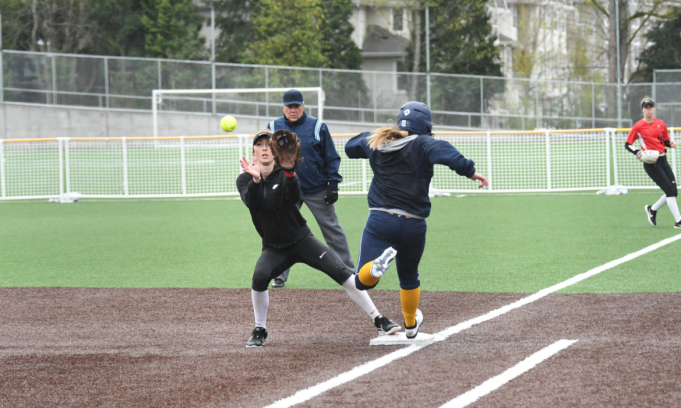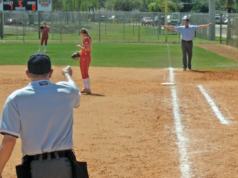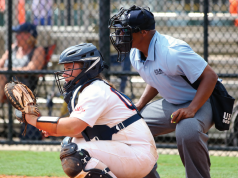One of the “catch-all” rules in softball refers to “making a travesty of the game.” That was put in place to take care of those players who try to make an umpire’s life unbearable. It ensures the shenanigans of a player do not cause so much confusion that an opponent winds up doing something that enables the offending team to gain an advantage. Just the sound of the words on paper conjure the notion of the “sacredness” of the game.
But what happens when a team accuses an umpire of making a travesty of the game? Surely you’ve heard, “You’re a joke!” While that disparaging remark is usually directed toward your alleged poor performance, the accusation that you are making a travesty of the game is more severe.
Perception, based on which side of the officiating ledger you are on, can be interpreted as “fairness” by an umpire and “travesty” by the team that wants a ruling to go it’s way. While one might think there is a broad line between what can be construed as a travesty versus what is deemed fairness, there really is a fine line between the two. Being able to discern between the two and being able to sell the ruling as fairness rather than travesty is an acquired skill by an umpire.
The situation in which those options come into play most often occurs when a veteran umpire is working with a rookie umpire. As a veteran, the decision to correct a rookie’s error can be difficult.
That difficult decision is based on the charge that umpires are not supposed to let either team gain an unfair advantage. When a rookie umpire totally blows an obvious ruling, the veteran must decide how to respond.
A veteran can respond by letting the ruling stand. The philosophy might be, “The rookie has got to learn from mistakes. If the new umpire takes enough heat, he or she will bear down and get the ruling right next time.”
That is faulty logic by the veteran. If the ruling is blatantly bad, the veteran has a responsibility to right the wrong. This isn’t about a bang-bang play in which the veteran might think the out was made and the ruling was safe. I’m referring to a play on which the team that benefited from the error in judgment knows the ruling isn’t right. And if it happened the other way, that team would want it corrected as well.
Some veterans would argue the rookie’s ruling has to be honored or you’ll change every close ruling. Again, we aren’t talking about the close rulings; we are talking about obvious blunders. If the veteran handles the situation appropriately, the teams will know what is going on.
And what is going on? Actually, it’s on-the-job training. You don’t always have the luxury of rookie umpires honing their skills in practice games. They enter the umpiring ranks in real-game situations and the pressure is great. That is why it behooves veterans to tactfully ensure the game is being played as close to right as can be.
The veteran might argue that overruling the ruling will embarrass the rookie. Yes, that is a possibility. However, my experience tells me the last thing a rookie wants to happen is for his or her erroneous ruling to have a bearing on the game. My experience also tells me that most teams that have even a smidgen of good sportsmanship in their hearts would rather the ruling be corrected. At least that’s the case in recreational leagues.
Teams know who the rookies are. They know there is a new face on the diamond. They notice that the veteran plate umpire is directing the rookie by gesturing to get in the correct position. They know the rookies by their tentative nature. So, I don’t think the embarrassment issue is really an issue. Teams are more forgiving than some veteran umpires would lead you to believe.
So, how do you tactfully handle the situation when you’ve got to help change an obvious erroneous ruling? First, call time. At the moment of the ruling, the offended team is already going to be soliciting your help. After time is called, head out to confer with your rookie partner. That indicates to the team that you are considering doing something, which usually quells the dissention. Then tell your partner, “That runner was really safe. We are going to change the ruling and get it right together. You’re going to change your ruling to safe and after the game we’ll talk about it.”
What has been the response from the rookie umpires I’ve worked with? Overwhelmingly it has been one of appreciation. Maybe he or she made the ruling too quickly. Immediately after the ruling even they knew they’d missed it badly. Maybe they got confused that the runner could leave the base on a fly ball when it was first touched rather than having to stay until the catch was completed.
As a veteran umpire, there have been times I’ve wanted my partner to overrule my blatantly bad ruling. There are some advantages to being a rookie.
Anthony “Corky” Carter is a longtime umpire and instructor from Brentwood, Tenn.
What's Your Call? Leave a Comment:
Note: This article is archival in nature. Rules, interpretations, mechanics, philosophies and other information may or may not be correct for the current year.
This article is the copyright of ©Referee Enterprises, Inc., and may not be republished in whole or in part online, in print or in any capacity without expressed written permission from Referee. The article is made available for educational use by individuals.


















